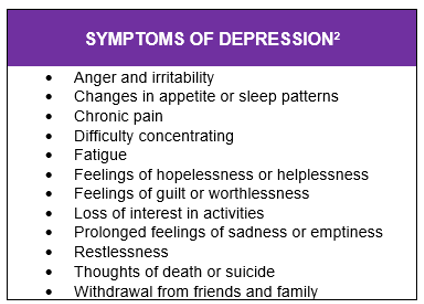Specialty Pharmacists Can Help Patients Battling Depression Amid Chronic Disease

It’s no surprise depression is one of the most common complications of chronic illness. In fact, it’s estimated approximately one-third of individuals with a diagnosed chronic condition have symptoms of depression or anxiety.1
Specialty pharmacists are well positioned as an easily accessible healthcare professional to help patients identify depression symptoms, erase the stigma of mental health conditions, and keep lines of communication open between the patient and their provider.
Depression
Depression is one of the most common mental disorders in the U.S., affecting about 21 million adults. Symptoms of depression can vary from person to person (see Table below). Depending on its severity, depression can affect many aspects of daily life.2

Those living with chronic medical conditions are at a higher risk for developing depression.3 Research shows when a patient has a chronic disease, there is less of a chance their depression will be diagnosed.2 Some patients may mistake depression symptoms, such as fatigue and loss of appetite, with their chronic condition instead of depression.3
Pharmacists can help educate patients on the links between depression and certain chronic conditions. They can also work with the patient’s care team to improve the identification and monitoring of mental health conditions, leading to proper treatment of depression in patients with lifelong conditions.
Depression in Chronic Disease
Cancer
When a patient is diagnosed with cancer, it is often an emotional time filled with uncertainties, worries and fear. Not surprisingly, depression can be common amongst cancer patients, from diagnosis throughout treatment.4 Although managing cancer and its treatments can be overwhelming, it is also important to tend to symptoms of depression. Counseling, treatment, or certain lifestyle changes might help cancer patients manage depression and their overall health.
Parkinson’s Disease
In Parkinson’s disease, nerve cells in the brain responsible for producing a chemical called dopamine are damaged. Dopamine impacts body movements, but it also is an important chemical messenger involved in reward, pleasure, and motivation.5 Researchers believe depression is due to changes in brain chemistry caused by the disease itself. For some patients, depression presents years before Parkinson's is even diagnosed. Some depression symptoms overlap with Parkinson’s disease symptoms, so it’s important for Parkinson’s patients to be very open with how they feel to their provider.5
Chronic Inflammatory Disease
Patients with inflammatory disease, such as rheumatoid arthritis (RA) or psoriasis, also face a greater risk for depression. Depression can be the result of coping with symptoms, stigmas and disabilities resulting from an inflammatory condition.6 For example, patients with a visible psoriatic rash might feel isolation and embarrassment. Likewise, RA patients experiencing a flare might feel helpless when losing the ability to perform normal daily tasks. Effective management of symptoms, paired with depression screening, is critical to improving the outcomes in patients with chronic inflammatory conditions.
For more information, visit Creaky Joints.
Multiple Sclerosis
Multiple sclerosis (MS) is a chronic, often disabling, autoimmune disease that affects about one million Americans.7 It is estimated that up to half of patients with MS may experience depression in their lifetime.8 MS can cause a wide variety of symptoms based on what part of the brain is affected. As a result, patients might suffer several symptoms, including fatigue, cognitive decline or difficulty completing daily tasks.9 It is no surprise coping with unpredictable symptoms and a decline in functional status could lead to depression.
For more information, visit the National Multiple Sclerosis Society.
Managing Depression
Learning skills to manage depression is vital to a patient’s overall well-being. Clinicians can help patients find practical ways to cope. For example, journaling might help some patients improve mental health. For other patients, staying active, engaging in activities unrelated to treatment, and socializing with others outside of their treatment community might help.10 It might also be useful for patients to define and work toward specific goals for self-care.
Along with lifestyle changes for self-care, some patients might require antidepressant medication. By having open discussions about behavioral health, clinicians and patients can find the best approach to managing depression alongside a chronic condition.
Sources
1 https://my.clevelandclinic.org/health/articles/9288-chronic-illness-and-depression
2 Overcoming depression: how psychologists help with depressive disorders. American Psychological Association Web site. http://www.apa.org/helpcenter/depression.aspx. Published October 2016. Last updated March 7, 2023.
3 Simon G. Treating depression in patients with chronic disease. West J Med. 2001;175(5): 292–293.
4 Anxiety and depression. Leukemia and Lymphoma Society Web site. https://www.lls.org/treatment/managing-side-effects/anxiety-and-depression. Accessed December 11, 2017.
5 https://www.parkinson.org/understanding-parkinsons/non-movement-symptoms/depression
6 Margeretten M, Julian L, Katz P, Yelin E. Depression in patients with rheumatoid arthritis: description, causes and mechanisms. Int J Clin Rheumtol. 2011;6(6):617–623.
7 https://www.nationalmssociety.org/About-the-Society/MS-Prevalence
8 Siegert RJ, Abernethy DA. Depression in multiple sclerosis: a review. J Neurol Neurosurg Psychiatry. 2005;76(4):469–475.
9 Hall-Flavin DK. Managing depression in MS. Mayo Clinic Web site. http://www.mayoclinic.org/diseases-conditions/multiple-sclerosis/expert-answers/managing-depression-in-ms/faq-20111498. Published October 3, 2014.
10 University of Michigan Depression Center Web site. http://www.depressiontoolkit.org/takecare/Journaling.asp.
Back to Blog > Blog Stories



